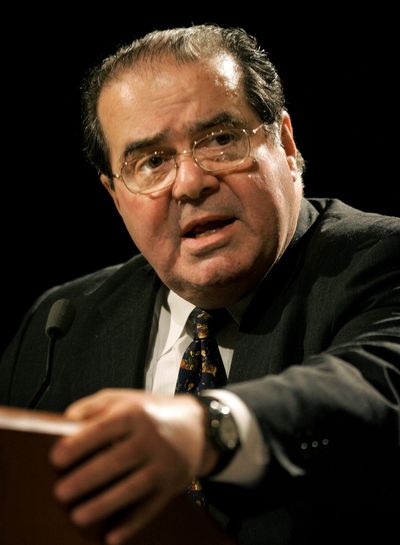Justices hear case on keeping sex offenders behind bars
No federal power for this, Scalia says

WASHINGTON – A group of dangerous sex criminals who took their case before the Supreme Court Tuesday had one clear champion: Justice Antonin Scalia.
A staunch conservative, he has not developed new sympathy for criminals. Instead, the issue before the court was whether the Constitution gave the federal government the power to lock up offenders after they had served their prison terms.
Scalia said protecting the public against sex criminals is a matter for the states, their police and their prisons. “There is no constitutional power on the part of federal government to protect society against sexual predators,” he told U.S. Solicitor General Elena Kagan.
Kagan, the Obama administration’s advocate, was defending a federal law that permits prison authorities to confine “sexually dangerous” people whose prison terms have run out. She won the apparent backing of liberal Justices Stephen Breyer and Ruth Bader Ginsburg.
Kagan said the Constitution gave the federal government specific powers, such as regulating interstate commerce, and all other powers “necessary and proper” to carry out those laws. Because Congress can punish interstate crimes such as putting child pornography on the Internet, federal authorities can also hold onto these criminals indefinitely if they are believed to be dangerous, Kagan argued. “What the federal government is doing here is essentially … making sure these people don’t fall between the cracks,” she said.
“This is a recipe for the federal government taking over everything,” Scalia interjected.
While Tuesday’s argument involved prisons and sex criminals, the reach of federal power will be tested on two fronts in the years ahead. If the Obama administration goes ahead with its plans to transfer some of the Guantanamo detainees to a federal prison in Thomson, Ill., it will face a suit on constitutional grounds. Civil libertarians say the federal government does not have the power to hold prisoners indefinitely without criminal charges being filed.
The pending health care bill is expected to trigger a different challenge to the reach of federal power. The bill requires nearly all people to buy insurance or to pay either a fine or a tax. Conservatives and libertarians argue the Constitution does not give the federal government the power to force individuals to buy a product, and they plan to sue in court if the bill passes.
The case heard Tuesday, U.S. v. Comstock, will decide the fate of part of the Adam Walsh Child Protection and Safety Act of 2006 in which Congress authorized civil commitment of “sexually dangerous” federal prisoners who were due for release. Kagan said 103 prisoners are being held under this law.
At least 20 states have similar laws, and the Supreme Court upheld these laws in 1997.